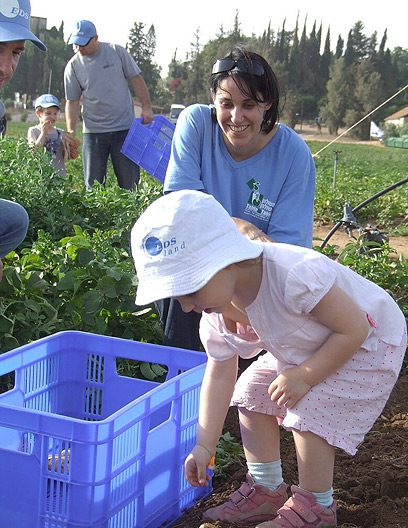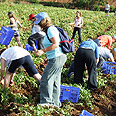The Jewish state faces the same problems as North America and Europe, stagnant or low wages, homelessness, increasing poverty. Furthermore, Israel does not have a food stamp program the way the US does, even though poverty levels are similar at over 20%.
The consequences of poor nutrition were highlighted by a Ben-Gurion University study that showed 34% of elderly Israelis who were hospitalized suffered from malnutrition resulting from a diet based on cheap foods such as bread and margarine.
Founded in 2003, Leket Israel, the “National Food Bank,” seeks to liberate excess nutritious food that for a variety of reasons would have been thrown out. It delivers this food to non-profit organizations who serve Israel’s poor.
“Along the whole food chain, waste does occur,” said Paul Leiba, Leket director of development. “We work to address the waste at every level.”
Leiba told Shalom Life that a lot of crops are not harvested for economic reasons; There is a point of equilibrium where after a while, harvesting more of a crop is not worthwhile. Leket is able to pick B grade crops that might not fetch enough at the market to be economically viable for the farmer but are perfectly suitable for eating. There is also a lot of waste along the food supply chain. They use 20 full-time pickers who travel to 250 farms across Israel, harvesting 60 different fruits and vegetables.
Their team covers over 300 kilometers, from the Golan to the desert, keeping in mind that that Israel yields four crops in a year. “That’s the beauty of being able to work in agriculture in Israel.”
After only seven years in existence, the agency has become the de facto umbrella for Israel’s food banks, shelters and other non-profits who work with the poor, acting as the middleman for the delivery of produce to 14,000 Israelis every day.

Collecting over 110 tons of food per week (Photo: Neta Meir)
With a dedicated staff and a large pool of 4,500 volunteers, the organization collects over 110 tons of food per week for over 230 soup kitchens, homeless shelters, senior citizen centers and other Israeli social organizations.
They also have night-time food rescuers, including 600 volunteers who drive around in trucks collecting 12,000 surplus meals every week from bar mitzvahs, weddings, restaurants, bakeries and catered venues. Corporate partners also donate thousands of perishable foods that are close to expiry but still fresh enough to eat along with manufactured foods that are in surplus supply, wrongly packaged or not fit to sell commercially.
“It’s based on a Biblical concept. We’ve reinvented that over the last five years or so,” he said.
Leket also has a separate pick up system for non-kosher food from restaurants that it distributes in single use containers to organizations serving non-Jews, including Arabs and approximately 1,000 of the 18,000 African refugees now living in Israel.
Because of today’s challenging economy, many Israelis are not able to eat nutritious foods on a regular basis; they end up either eating cheap, processed foods or may skip meals, especially if they are parents who have to feed their children. There are also no hot lunch or breakfast programs in Israel for children living in poverty.
'Every pair of hands helps'
Children can’t function in school if they are not eating. To this end, Leket has a sandwich program that feeds 5,500 kids per day. However, “that addresses some part of the problem but not the whole part,” said Leiba.
For instance, in immigrant communities, many children are forced to take on parents’ jobs, translating for their parents or supporting their families financially. Fifty per cent of Ethiopians in Israel live below the poverty line; many in the Russian community, especially the elderly, are only able to find low paying jobs or are not employed. It’s the same story for all low income communities.
Leiba explained that the minimum wage in Israel is not sufficient at only 3,800 shekels per month; the poverty line itself is $5,500 per month for a family of four (about $1,500 CAD). And with the economic crisis of the last few years, those of lower economic status have been the worst hit.
Poor people tend to eat cheap, meaning processed food with all nutrients taken from it. Leiba pointed out that studies have found increased obesity, heart disease and blood pressure among the poor. It’s a vicious cycle. “Not only quality of life but it is increasing the burden on the state’s health system.”
Leket therefore has a certified nutritionist on staff and they are educating the non-profits they work with to provide balanced food to their clients; a move to whole grain foods, rice, peas, hummus and beans.
“Every pound of food that is rescued is a pound that otherwise would be destroyed. Every pair of hands helps.”
For more information, visit www.leket.org or email Deena@leket.org
Any volunteer help is greatly appreciated. People are encouraged to volunteer for as little as one hour when visiting Israel.
Reprinted with permission from Shalom Life
















